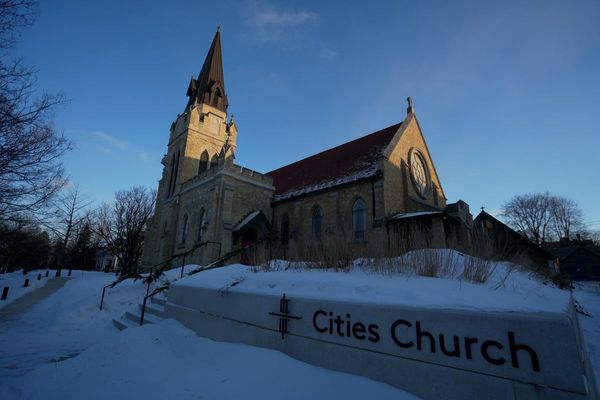GLADSTONE, Mo. — As a Democrat running for the Senate in Missouri, a state that his party has largely written off, Lucas Kunce is used to skeptics.
So when a woman raised her hand at a recent campaign event and said, “I love what you’re saying,” then struggled to articulate her question, Kunce sensed there was a catch.
“This is like a breakup,” Kunce joked. “Is there a ‘but’ coming?”
Everyone laughed. This was friendly ground, close enough to the left-leaning Kansas City suburbs that a Friday evening campaign event in the sweltering storefront headquarters of the Clay County Democratic Party could draw a standing-room only crowd.
But Kunce, 39, who is running to replace retiring Republican Sen. Roy Blunt, is used to tougher audiences. He swiftly pivoted from the question, which turned out to be about campaign finance, to talking points he has been honing on conservative talk radio shows and in rural counties in the state’s northeast and southeast.
Those are areas that used to elect Democrats, back when Missouri was considered a bellwether state that chose the winning candidate in all but one presidential election from 1904 to 2004.
Since then, Democrats have lost ground as areas dominated by rural and working-class voters became strongholds for former President Donald Trump’s brand of populism.
Democrats’ response had been an attempt to run up their numbers in left-leaning cities and suburbs.
But Kunce, a 13-year Marine veteran, is among a handful of Democrats this year — including Senate candidates John Fetterman in Pennsylvania and Tim Ryan in Ohio — working to win back disaffected voters with their own populist economic message that is sometimes at odds with party decision-makers in Washington.
And though even Kunce’s campaign admits that he is working against the odds in a year that isn’t expected to favor Democrats, his unorthodox approach has attracted national attention as a potential model for how the party could win in the heartland.
“In my opinion, he has the best message of any candidate this cycle,” said Stephanie Taylor, co-founder of the Progressive Change Campaign Committee, a Democratic group that has endorsed Kunce. “The right wing says, ‘You have been done wrong by all these institutions, government bureaucracy, big corporations.’ Voters might be thinking about medical debt, about bad credit scores.The right-wing politician will say, ‘Vote for me to break it up and blow it up.’ The instinct among so many in the Democratic establishment is to defend institutionalism. By contrast, Lucas’ answer … (is) ‘Yes, it’s broken. And vote for me so we can fix it.’”
Democrats not spared
Kunce says he is running to “fundamentally change who has the power in this country,” and he doesn’t spare Democrats from his critique.
“They take money from the wrong people,” he says during his stump speech. “And they make decision after decision that strips our communities for parts for their own political power and the power of the people who are running their campaigns.”
Kunce’s pitch touches on everything from banning stock ownership for members of Congress to breaking up corporate monopolies to creating a “Marshall Plan for the Midwest” that would redirect federal spending from nation-building in other countries.
He rails against big-box stores that have gutted local economies and investors who have jacked up housing prices, and he promises to ban foreign ownership of American agricultural land to counter what he describes as a “farming crisis” caused by multinational corporations that have “gobbled up” American farmland.
He makes references to his deployments in Iraq and Afghanistan, his tour on the Joint Staff at the Pentagon and to his humble upbringing in Jefferson City, Missouri, where he says his family went bankrupt trying to pay medical bills for his sister’s congenital heart condition.
“My parents, they’re a classic Missouri story,” he told the crowd in Clay County. “They got married at 19 and 22. They had four kids — they’re Catholic — and before you knew it, I remember going to the grocery store with my parents and watching my mom write the check on the 25th, 26th, 27th of the month and begging the manager down at Lee’s Market in Jeff City — thank you, Mr. Rackers — not to cash it till the end of the month.”
Kunce promises to be a fighter, and he still has the wiry physique of a soldier, but his delivery is folksy, with a winking humor and a coiled energy that keeps him moving even in the narrow space.
The crowd laughs and applauds at the right places. But when he asks for questions, one woman asks how he is being received in northern parts of the state, where she said former Sen. Claire McCaskill, the last Democrat to be elected statewide, had “a real tough time” in her 2018 reelection loss to Republican Josh Hawley. Another wants to know how conservative Republicans respond to his pitch.
Both are important questions. Kunce’s campaign team says he does not have to win in areas that have voted overwhelmingly for Republicans in recent cycles, but he does have to narrow the gap. Kunce says he’s doing that.
“When I’m on conservative talk radio, they’re like, ‘Oh man, I wish you were a Republican,’” he said. “This is what people want from both parties.”
Truman influence
Kunce has made his home and campaign headquarters in Independence, on the outskirts of Kansas City and within walking distance from the childhood home of “straight-talking” former President Harry Truman — one of the only Democrats he cites as an influence. But the leafy streets in the renovated downtown quickly fall away to a landscape of weedy lots and cinder block buildings advertising adult books and appliance repairs.
Driving through those neighborhoods on the way back from the campaign event, Kunce’s deputy campaign director, Connor Lounsbury, argues that voters are longing for authenticity. There is also a “righteous” anger rooted in a feeling that federal investment, whether during the recovery from the 2008 recession or in the bipartisan infrastructure plan that Democrats are touting this cycle, always goes someplace else.
Those voters want someone who will fight for them, as Democrats used to say they would when they were the party of the unions and the working class, Lounsbury said. But these days, the left is associated with coastal elites.
Republicans need only a net gain of one seat to win control of the Senate, and neither party is talking much about Blunt’s seat being in play.
But a crowded Republican primary with no clear front-runner has pushed all the candidates to the right, and could deliver the nomination to former Gov. Eric Greitens, who still has a loyal following in the state in spite of a series of scandals — including his ex-wife’s allegation that he abused her and their children. National Republicans, already worried about nominees in other competitive Senate races with checkered histories that could turn off general election voters, have urged Trump to stay out of the race. But Trump has stoked fears that he was leaning toward a Greitens endorsement.
In that climate, a Republican who had been serving as an investigator on the House select committee investigating the Jan. 6 assault on the Capitol, John Wood, shook up the race when he announced last month he was running as an independent. Kunce welcomed the news, saying Wood is a “country club Republican” who would divide the GOP electorate but could never win enough pro-Trump voters on the far right to have a chance.
Kunce also has his own crowded primary, with Trudy Busch Valentine, a St. Louis-area philanthropist and heir to a share of the Busch family beer fortune, representing his most formidable opposition. Valentine hasn’t had to file federal campaign fundraising reports since entering the race in late March. But she reported tens of millions of dollars in assets and income on a financial disclosure earlier this month.
Kunce says what sets him apart is money he has raised from small-dollar donors. Even while pledging not to take corporate PAC money — something non-incumbents rarely receive any way — his campaign announced last week that he had raised $1.1 million from April through June, after raising $850,000 in the quarter before.
‘Authentic messengers’ wanted
Aftyn Behn, the campaign director for RuralOrganizing.org — one of several Democratic groups focused on winning rural voters that has sprung up in the aftermath of Trump’s election — said their research shows that rural voters are receptive to populist messages.
“Rural voters aren’t looking for a more corporate candidate,” she said. “They’re looking for a candidate who will fight for small businesses, fight corruption. They really want authentic messengers.”
The group has been advising Democrats to adopt “hyperlocal strategies,” hire local campaign teams and not to skirt identity issues, like support for abortion rights, that their polling says are popular in rural areas, contrary to a lot of assumptions. Those are all things Kunce is doing.
He brags that 14 of the 18 people on his staff are from Missouri. And he says outlawing abortion on a federal level will create a “two-tiered system” under which “country club Republicans” will still fly their wives and daughters and mistresses to get legal abortions.
“That’s un-American,” he said, adding that he wants to get rid of the filibuster to codify Roe v. Wade.
Daniel Ponder, a Drury University political scientist, said Missouri voters have shown their receptiveness to progressive issues even in areas that have become deeply Republican. In 2018, the same year Hawley won the Senate race, Missouri voters overwhelmingly passed measures to legalize medical marijuana and raise the minimum wage, for example.
“I do think that Democrats are going to claw their way back into it, and I think Kunce is on to the right strategy,” he said. “Whether that takes root in 2022 or not is the question. I kind of doubt it. We’re still in a polarized era. Maybe over the next few election cycles.”
‘A tough one’
Back at the Clay County Democratic headquarters, Democrats who listened to Kunce said they liked that he was, as one voter put it, “willing to play hardball” with the GOP, when so many Democrats seem to be playing softball. They wanted to believe he had a chance. But they also worried that he was too young, that he wouldn’t have the money to wage a competitive campaign or, as a freshman senator, have the clout to follow through on his promises.
“I think he’s a nice guy, but I’m really cynical about this,” said Tom Gant, 79, a retired salesman from North Kansas City. “I think the train has already left the station.”
Lauren Guidry, 19, a student at Howard University who was the only Black woman and one of the youngest people in the crowd, said the fight over abortion rights had made her want to become more politically active, and she liked Kunce’s campaign.
Even though she acknowledged that she didn’t think she was the target audience, she said it might take someone with Kunce’s “aesthetic” — white, male, military — to appeal to the voters he needs to reach.
Deborah Ferrell-Day, 67, a retired utility company worker from Gladstone, said she had volunteered for McCaskill in 2018 and was disheartened to see her work so hard to engage rural voters and still lose them at the polls. She hoped Kunce’s military background could help him make inroads where McCaskill couldn’t.
But asked whether any Democrat could win statewide in Missouri, she paused and chose her words carefully.
“Wow, that’s a tough one,” she said. “I want to be hopeful about it, but I’m, you know — we’re a dying breed.”







